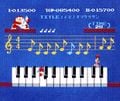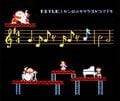Donkey Kong no Ongaku Asobi: Difference between revisions
LinkTheLefty (talk | contribs) mNo edit summary |
No edit summary |
||
| Line 32: | Line 32: | ||
File:DonkeyBand.jpg|Donkey Band | File:DonkeyBand.jpg|Donkey Band | ||
</gallery> | </gallery> | ||
==Trivia== | |||
*Although the game was never released, Lady, or rather, Pauline's role as the vocalist in a band was ultimately reused with her acting as the lead singer in [[The Super Mario Players]] band in ''[[Super Mario Odyssey]]''. | |||
==Names in other languages== | ==Names in other languages== | ||
Revision as of 20:48, November 24, 2018
Template:Infobox Donkey Kong no Ongaku Asobi is a canceled game set for release on the Family Computer. It would have followed Popeye no Eigo Asobi and released alongside Donkey Kong Jr. Math as one of the edutainment games based on the Famicom's launch titles.
Donkey Kong no Ongaku Asobi starred the cast of Donkey Kong and Donkey Kong Jr. The game never surfaced, and seems to have only been announced in 1983 in a Japanese handbill as well as magazines.[1][2]
Game Modes
The game featured two modes: Music Quiz and Donkey Band.
Music Quiz
Music Quiz would seem to involve making bassist Donkey Kong play displayed notes by hammering piano keys with Mario and Lady. Screenshots of the game revealed one- and two-player variations:
- One Player: Mario plays the notes, with Lady and her hammer on the sidelines.
- Two Players: Both Mario and Lady play the notes; Mario is Player 1, while Lady is Player 2.
Donkey Band
Donkey Band would be played as a karaoke styled game in which included the player singing into the Famicom player 2 controller microphone. Donkey Kong is on bass once more with Donkey Kong Jr. playing drums, Mario playing a grand piano and Lady as a vocalist.
Gallery
Trivia
- Although the game was never released, Lady, or rather, Pauline's role as the vocalist in a band was ultimately reused with her acting as the lead singer in The Super Mario Players band in Super Mario Odyssey.
Names in other languages
| Language | Name | Meaning | Notes |
|---|---|---|---|
| Japanese | ドンキーコングの音楽遊び[?] Donkī Kongu no Ongaku Asobi |
Donkey Kong's Music Play |
References
- ^ Donkey Kong’s Fun With Music [NES – Cancelled]. Unseen 64. Accessed June 16, 2008.
- ^ Cifaldi, Frank. Nintendo’s (First) Lost Donkey Kong Game. The Video Game History Foundation. Retrieved November 10, 2018.

